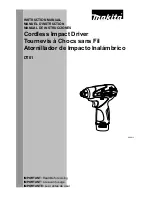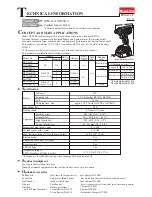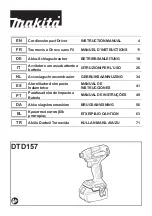
EN
124
EN
125
b)
Additional safety measure shall be taken
to protect the user from effects of vibra-
tion.
Maintain the tool and its accessories,
keep hands warm and organize work pat-
terns and periods.
ADDITIONAL SAFETY INSTRUCTIONS FOR
BATTERY OPERATED DRILL AND DRIVER
a)
Hold power tool by insulated gripping
surfaces, when performing an operation
where the cutting accessory or fastener
may contact hidden wiring.
Cutting ac-
cessory or fasteners contacting a “live”
wire may make exposed metal parts of the
power tool “live” and could give the opera-
tor an electric shock.
b)
Secure the workpiece.
A workpiece
clamped with clamping devices or in a vice
is held more secure than by hand.
c)
Take protective measures when dust
can develop during working that is
harmful to one’s health, combustible or
explosive.
Example: Some dusts are re-
garded as carcinogenic. Wear a dust mask
and work with dust/chip extraction when
connectable.
d)
Before any work on the machine (e.g.,
maintenance, tool change, etc.) as well
as during transport and storage, set the
rotational direction switch to the centre
position.
Unintentional actuation of the On/
Off switch can lead to injuries.
e)
Hold the machine with a firm grip.
High
reaction torque can briefly occur while driv-
ing in and loosening screws.
f)
Switch off the power tool immediately
when the tool inserted jams. Be prepared
for high reaction torque that can cause
kickback.
The tool insert jams when:
- the power tool is subject to overload or
- it becomes wedged in the work piece.
g)
Use a metal detector to determine if
there are gas or water pipes hidden in
the work area or call the local utility
company for assistance before begin-
ning the operation.
Striking or cutting into
a gas line will result in explosion. Water en-
tering an electrical device may cause elec-
trocution.
SAFETY INSTRUCTIONS FOR BATTERY
1.
Never use a damaged battery.
2.
Do not open the battery. There is a
risk of a short-circuit.
3.
Protect the battery from heat, e.g.
from continuous exposure to sun-
light, fire, water and humidity. There
is a risk of explosion.
4.
In case of damage and improper
use of the battery, vapours may be
emitted. Ventilate the area and seek
medical help in case of complaints.
The vapours can irritate the respira-
tory system.
5.
Under abusive conditions, liquid
may be ejected from the battery;
avoid contact. If contact acciden-
tally occurs, flush with water. If liq-
uid contacts eyes, additionally seek
medical help. Liquid ejected from
the battery may cause irritation or
burns.
6.
Use only original batteries with the
voltage indicated on the rating plate
of your electric power tool. If other
batteries are used, e.g. imitations,
reconditioned batteries or third-
party products, there is a risk of
injuries as well as damage caused
by exploding batteries.
7.
The battery voltage must match the
battery charging voltage of the bat-
tery charger. Otherwise there is a
risk of fire and explosion.
8.
Recharge only with the charger
specified by the manufacturer. A
charger that is suitable for one type
of battery pack may create a risk of
fire when used with another battery
pack.
9.
Pointed objects, such as nails or
screwdrivers, or external forces
may damage the battery. This may
cause an internal short-circuit and
the battery to burn, smoke, explode
or overheat.
10.
When not in use, keep the battery
away from paper-clips, coins, keys,
nails, screws, or other small metal
objects, that can cause a short-cir-
cuit at the charging contacts.
11.
Used batteries must be disposed of
safely and correctly.






































